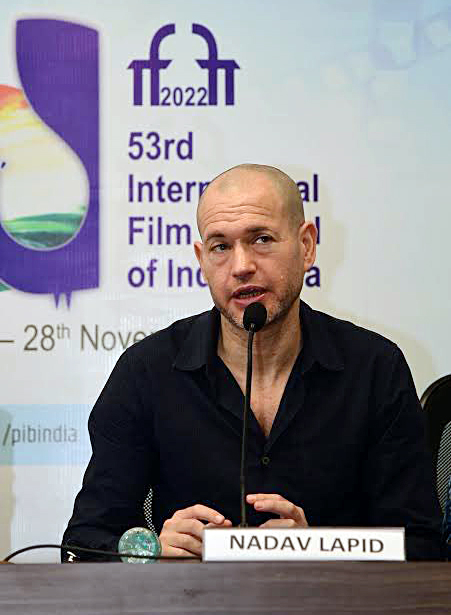The acerbic and insensitive comments made by Nadav Lapid, an Israeli filmmaker about Vivek Agnihotri’s movie, The Kashmir Files has expectedly stirred a hornets’ nest, provoking many Indians to post a strong rebuttal to his remarks.
Nadav Lapid, speaking at the closing ceremony of the 53rd edition of the International Film Festival of India (IFFI), for which he was also the jury head, had averred: “Usually, I don’t read from paper. This time, I want to be precise. I want to thank the director and head of the programming of the festival for its cinematic richness, the diversity and complexity…There were 15 films in the international competition—the front window of the festival. Fourteen out of them had the cinematic qualities…and evoked vivid discussions. We were, all of us, disturbed and shocked by the 15th film, The Kashmir Files. That felt to us like a propaganda, vulgar movie, inappropriate for an artistic competitive section of such a prestigious film festival.”
Was Nadav Lapid justified in making these remarks? Or did he cross the line and venture into an area which was not his domain? Did his remarks betray his ignorance of Indian history and the Hindu-Muslim dynamics of current India? And did his words trivialise the sufferings of Kashmiri Pandits?
Before we proceed to dissect his remarks, we need to delve into Nadav Lapid’s background to better understand this controversy.
Nadav Lapid is a filmmaker and writer who is the recipient of several international awards. He is best known for his film Synonyms (2019), which depicts the life of an ex-Israeli soldier, who flees to Paris to escape his Jewish identity. His other films include the Kindergarten Teacher (2014), Policeman (2011) and, Ahed’s Knee (2021).
Nadav Lapid is the quintessential anti-establishment figure, who revels in needling governments or challenging the official party line. He has butted heads with his own government. He was one of the signatories who opposed the Israeli government’s Shomron (Samaria/West Bank) Film Fund, for he felt that the fund was a direct inducement for Israeli filmmakers to “actively participate in whitewashing the occupation in exchange for financial support and prizes”.
Additionally, he also belongs to the tribe of self-loathing individuals who are filled with hate for themselves, their people and their country. While speaking of his film the Synonyms he once remarked: “The film talks about the collective Israeli soul and the Israeli collective soul is a sick soul. Something in the deepest essence of the Israeli existence is false, is rotten. It’s not just Benjamin Netanyahu, it’s not special to Israel. But, at the same time, I think this Israeli sickness or nature is characterized by young Israeli men—muscular, smiling, who don’t raise any questions and don’t have any doubts. They are extremely proud of being Israeli. They have a totally dichotomist vision of existence: Us versus all the others.”
First, by his remarks at the IFFI, Nadav Lapid, in line with his own thinking, was making common cause with the Hinduphobic Hindus who abound in India. I would not be surprised to find out that if he was prodded into making these comments by some of them.
Second, we as Indians must understand that his words do not represent the opinion of most Israelis or the Israeli government, which was abundantly made clear by Israel’s envoy to Delhi, Naor Gilon, who distanced himself and Israel from Lapid’s remark. Gilon responded: “The friendship between the people and the states of India and Israel is very strong and will survive the damage you have inflicted. As a human being, I feel ashamed and want to apologize to our hosts for the bad manner in which we repaid them for their generosity and friendship.”
A film can be acclaimed for its artistic merits or criticised for its de-merits. But it also needs to be vetted for the reality it portrays. By using the words vulgar and propaganda, Nadav Lapid was not commenting on its artistic traits alone (which would have been acceptable) but making a statement on its authenticity. In his ignorance of Indian history and Hindu-Muslim dynamics, he trivialised the suffering of Kashmiri Hindus. That is where he erred.
Filmmaker Vivek Agnihotri rightly responded: “I challenge the world’s intellectuals and ‘urban Naxals’ as well as the great filmmaker who came from Israel if they can prove that any shot, dialogue or event of The Kashmir Files is not absolute truth, I’ll stop making films. I’m not someone who will back down. “
In the end, truth and morality has to trump art. A movie that is artistically subpar but one that denotes the truth is far more acceptable than a movie that is artistically perfect but factually and morally challenged.
Why Nadav Lapid was wrong
- Advertisement -

